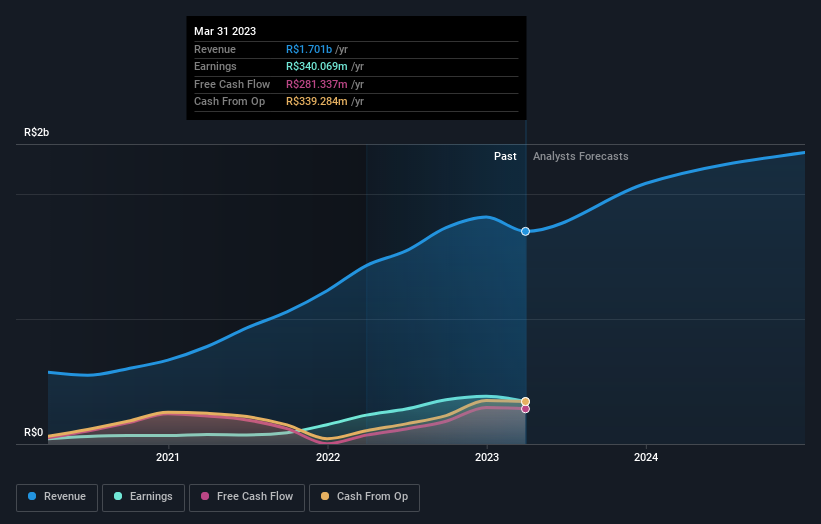individual investors who own 47% along with institutions invested in Kepler Weber S.A. (BVMF:KEPL3) saw increase in their holdings value last week

Key Insights
- The considerable ownership by individual investors in Kepler Weber indicates that they collectively have a greater say in management and business strategy
- The top 15 shareholders own 50% of the company
- Institutions own 39% of Kepler Weber
To get a sense of who is truly in control of Kepler Weber S.A. (BVMF:KEPL3), it is important to understand the ownership structure of the business. With 47% stake, individual investors possess the maximum shares in the company. That is, the group stands to benefit the most if the stock rises (or lose the most if there is a downturn).
While individual investors were the group that benefitted the most from last week’s R$157m market cap gain, institutions too had a 39% share in those profits.
Let's take a closer look to see what the different types of shareholders can tell us about Kepler Weber.
Check out our latest analysis for Kepler Weber

What Does The Institutional Ownership Tell Us About Kepler Weber?
Institutional investors commonly compare their own returns to the returns of a commonly followed index. So they generally do consider buying larger companies that are included in the relevant benchmark index.
As you can see, institutional investors have a fair amount of stake in Kepler Weber. This suggests some credibility amongst professional investors. But we can't rely on that fact alone since institutions make bad investments sometimes, just like everyone does. If multiple institutions change their view on a stock at the same time, you could see the share price drop fast. It's therefore worth looking at Kepler Weber's earnings history below. Of course, the future is what really matters.

We note that hedge funds don't have a meaningful investment in Kepler Weber. Our data shows that Trigono Capital is the largest shareholder with 20% of shares outstanding. Tarpon Gestora de Recursos S.A. is the second largest shareholder owning 8.6% of common stock, and BNDES Participações S.A. - BNDESPAR holds about 5.0% of the company stock.
A closer look at our ownership figures suggests that the top 15 shareholders have a combined ownership of 50% implying that no single shareholder has a majority.
While studying institutional ownership for a company can add value to your research, it is also a good practice to research analyst recommendations to get a deeper understand of a stock's expected performance. There is some analyst coverage of the stock, but it could still become more well known, with time.
Insider Ownership Of Kepler Weber
While the precise definition of an insider can be subjective, almost everyone considers board members to be insiders. Management ultimately answers to the board. However, it is not uncommon for managers to be executive board members, especially if they are a founder or the CEO.
Insider ownership is positive when it signals leadership are thinking like the true owners of the company. However, high insider ownership can also give immense power to a small group within the company. This can be negative in some circumstances.
We note our data does not show any board members holding shares, personally. Given we are not picking up on insider ownership, we may have missing data. Therefore, it would be interesting to assess the CEO compensation and tenure, here.
General Public Ownership
With a 47% ownership, the general public, mostly comprising of individual investors, have some degree of sway over Kepler Weber. While this size of ownership may not be enough to sway a policy decision in their favour, they can still make a collective impact on company policies.
Private Equity Ownership
With a stake of 14%, private equity firms could influence the Kepler Weber board. Some might like this, because private equity are sometimes activists who hold management accountable. But other times, private equity is selling out, having taking the company public.
Next Steps:
While it is well worth considering the different groups that own a company, there are other factors that are even more important. For instance, we've identified 1 warning sign for Kepler Weber that you should be aware of.
But ultimately it is the future, not the past, that will determine how well the owners of this business will do. Therefore we think it advisable to take a look at this free report showing whether analysts are predicting a brighter future.
NB: Figures in this article are calculated using data from the last twelve months, which refer to the 12-month period ending on the last date of the month the financial statement is dated. This may not be consistent with full year annual report figures.
Valuation is complex, but we're here to simplify it.
Discover if Kepler Weber might be undervalued or overvalued with our detailed analysis, featuring fair value estimates, potential risks, dividends, insider trades, and its financial condition.
Access Free AnalysisHave feedback on this article? Concerned about the content? Get in touch with us directly. Alternatively, email editorial-team (at) simplywallst.com.
This article by Simply Wall St is general in nature. We provide commentary based on historical data and analyst forecasts only using an unbiased methodology and our articles are not intended to be financial advice. It does not constitute a recommendation to buy or sell any stock, and does not take account of your objectives, or your financial situation. We aim to bring you long-term focused analysis driven by fundamental data. Note that our analysis may not factor in the latest price-sensitive company announcements or qualitative material. Simply Wall St has no position in any stocks mentioned.
About BOVESPA:KEPL3
Kepler Weber
Provides storage equipment and post-harvest grain solutions in Brazil, Central and South America, Africa, and Asia.
Undervalued with excellent balance sheet.
Similar Companies
Market Insights
Community Narratives



